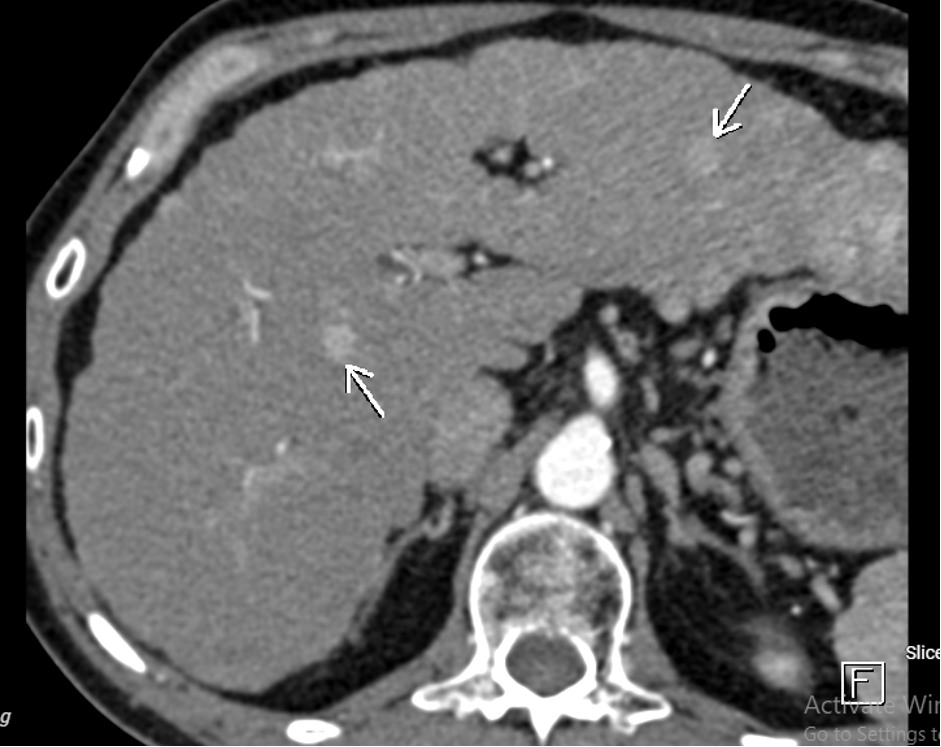Ultrasound and CT scans at Tam Anh General Hospital in Hanoi revealed multiple liver tumors invading blood vessels, the largest measuring 3.5 cm, accompanied by stage F4 cirrhosis. Dr. Tran Hai Binh, Deputy Head of the Oncology Department, diagnosed Mr. Hoan with late-stage liver cancer, estimating a survival time of less than a year without treatment.
Mr. Hoan had been consuming alcohol for decades and was first diagnosed with liver cancer in 2015. At that time, the tumor was small and the disease was in its early stages, allowing for treatment with radiofrequency ablation. However, he experienced three more relapses between 2019 and 2023, each treated with different methods, while he continued to drink over a liter of alcohol daily.
This time, Dr. Binh stressed the urgency of quitting alcohol, emphasizing the severe liver damage and the futility of any treatment if the habit persisted. Mr. Hoan agreed to stop drinking and began a regimen of two new-generation immunotherapy drugs combined with a specialized diet for cirrhosis patients to improve liver function and overall health.
After three cycles, a CT scan showed a 30% reduction in tumor size, and blood tests indicated a decrease of over 50% in liver cancer markers. Mr. Hoan gained weight, his appetite improved, his mental state stabilized, and his resolve to abstain from alcohol strengthened.
 |
Mr. Hoan's multifocal liver tumor on a CT scan. Photo: Tam Anh General Hospital |
Dr. Binh noted that many liver cancer patients have a history of long-term alcohol consumption. Approximately 15-20% of liver cancer patients examined at the Oncology Department of Tam Anh General Hospital in Hanoi have this history. While most patients stop drinking after their diagnosis, about 5% continue. Many only abstain initially, relapsing into alcohol consumption after treatment, creating a vicious cycle: alcohol, cirrhosis, liver cancer, treatment, and then back to alcohol, repeating until the cancer progresses significantly and the body weakens.
Treating cancer in individuals with alcohol addiction presents numerous challenges. Beyond physical treatment, doctors must provide psychological counseling to support patients in their commitment to sobriety. Severe cases may require intervention for alcohol withdrawal, combined with medication, nutritional support, and liver supplements. Family involvement is crucial, providing ongoing monitoring and encouragement for the patient to remain alcohol-free, even after achieving stable treatment outcomes.
 |
Dr. Binh consults with a cancer patient. Photo: Tam Anh General Hospital |
Alcohol is a leading risk factor for various cancers, including liver cancer. Alcohol damages the liver, causing injury, cirrhosis, and ultimately, cancer. Drinking during cancer treatment also risks drug interactions and adverse effects. Dr. Binh advises adults to avoid alcohol altogether. If unavoidable, men should limit intake to a maximum of two drinks and women to one drink per day.
Various treatments for liver cancer exist, including surgery and radiofrequency ablation. In advanced or late stages, newer therapies like immunotherapy and targeted therapy help control tumor growth. However, sustaining treatment effectiveness requires patient cooperation and adherence to a healthy diet and exercise regimen, especially complete abstinence from alcohol.
Liver cancer ranks second in new cases and first in cancer mortality rates in Vietnam, according to Globocan 2022 statistics. It also has the highest incidence among men. According to 2024 World Health Organization (WHO) statistics, Vietnam leads Southeast Asia in alcohol consumption, with an average of 8.9 liters of pure alcohol per person (over 15 years old) in 2019, exceeding Thailand (8.3 liters) and Singapore (2.9 liters).
Hoai Pham
*The patient's name has been changed.
| Readers can submit questions about cancer here for doctors to answer. |












